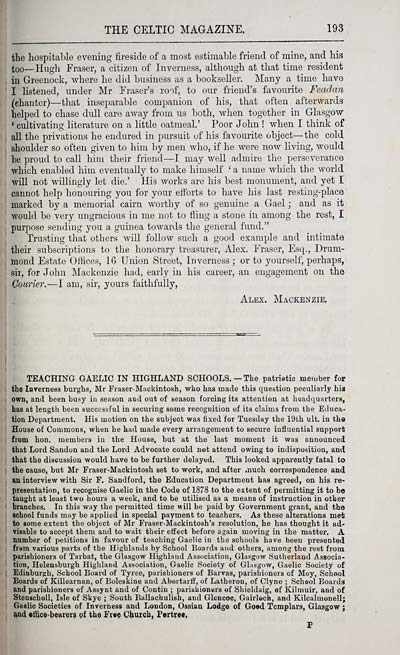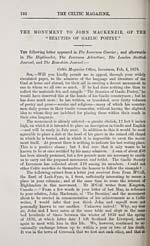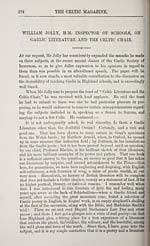Blair Collection > Celtic magazine > Volume 3
(203)
Download files
Complete book:
Individual page:
Thumbnail gallery: Grid view | List view

THE CELTIC MAGAZINE. 193
the hospital)le evening fireside of a most estimable friend of mine, and his
too— Hugli Fraser, a citizen of Inverness, although at that time resident
in Greenock, where he did business as a bookseller. Many a time have
I listened, under Mr Eraser's roof, to our friend's favourite Feadan
(chanter) — that inseparable companion of his, that often afterwards
helped to chase didl care away from us both, when together in Glasgow
'cultivating literature on a little oatmeal.' Poor John ! when I think of
all the privations he endured in pursuit of his favourite object — the cold
shoulder so often given to him by men who, if he Avere now living, would
be proud to call him their friend — I may well admire the perseverance
•which enabled him eventually to make himself ' a name which the world
will not willingly let die.' His works are his best monument, and yet I
cannot help honouring you for your efforts to have his last resting-place
marked by a memorial cairn worthy of so genuine a Gael ; and as it
would be very ungracious in me not to fling a stone in among the rest, I
purpose sending you a guinea towards the general fund."
Trusting that others will follow such a good example and intimate
their subscriptions to the honorary treasurer, Alex. Eraser, Esq., Drum-
mond Estate (Jffices, 16 Union Street, Inverness ; or to yourself, perhaps,
sir, for John Mackenzie had, early in his career, an engagement on the
Courier. — I am, sir, yours faithfully,
Alex. Mackenzie,
TEACHING GAELIC IN HIGHLAND SCHOOLS.— The patriotic member for
: the Inverness burghs, Mr Fraser-Mackintosh, who has made this question peculiarly his
own, and been busy in season and out of season forcing its attention at headquarters,
has at length been successful in securing some recognition of its claims from the Educa-
tion Department. His motion on the subject was fixed for Tuesday the 19th ult. in the
House of Commons, when he had made every arrangement to secure influential support
from hon. members in the House, but at the last moment it was announced
that Lord Sandun and the Lord Advocate could not attend owing to indisposition, and
that the discussion would have to be further delayed. This looked apparently fatal to
i the cause, but Mr Fraser-Mackintosh set to work, and after inuch correspondence and
I au interview with Sir F. Sandford, the Education Department has agreed, on his re-
presentation, to recognise Gaelic in the Code of 1878 to the extent of permitting it to bo
taught at least two hours a week, and to be utilised as a means of instruction in other
' branches. In this way the permitted time will be paid by Government grant, and the
school funds may be applied in special payment to teachers. As these alterations met
to some extent the object of Mr Fraser-Mackintosh's resolution, he has thought it ad-
visable to accept them and to wait their effect before again moving in the matter. A
number of petitions in favour of teaching Gaelic in the schools have been presented
frem various parts of the Highlands by School Boards and others, among the rest from
parishioners of Tarbat, the Glasgow Highland Association, Glasgow Sutherland Associa-
tion, Helensburgh Highland Association, Gaelic Society of Glasgow, Gaelic Society of
. Edinburgh, School Board of Tyree, parishioners of Barvas, parishioners of Moy, School
Boards of Killearnan, of Boleskine and Abeitarff, of Latheron, of Clyne ; School Boards
' and parishioners of Assynt and of Contin ; parishioners of Shieldaig, of Kilmuir, and of
Stenscholl, Isle of Skye ; South Ballachulish, and Glencoe, Gairlech, and Kilcalmonell;
: Gaelic Societies of Inverness and London, Ossian Lodge of Gosd Templars, Glasgow ;
And ofiice-bearers of tho Fi«6 Church, F«rtr«e.
the hospital)le evening fireside of a most estimable friend of mine, and his
too— Hugli Fraser, a citizen of Inverness, although at that time resident
in Greenock, where he did business as a bookseller. Many a time have
I listened, under Mr Eraser's roof, to our friend's favourite Feadan
(chanter) — that inseparable companion of his, that often afterwards
helped to chase didl care away from us both, when together in Glasgow
'cultivating literature on a little oatmeal.' Poor John ! when I think of
all the privations he endured in pursuit of his favourite object — the cold
shoulder so often given to him by men who, if he Avere now living, would
be proud to call him their friend — I may well admire the perseverance
•which enabled him eventually to make himself ' a name which the world
will not willingly let die.' His works are his best monument, and yet I
cannot help honouring you for your efforts to have his last resting-place
marked by a memorial cairn worthy of so genuine a Gael ; and as it
would be very ungracious in me not to fling a stone in among the rest, I
purpose sending you a guinea towards the general fund."
Trusting that others will follow such a good example and intimate
their subscriptions to the honorary treasurer, Alex. Eraser, Esq., Drum-
mond Estate (Jffices, 16 Union Street, Inverness ; or to yourself, perhaps,
sir, for John Mackenzie had, early in his career, an engagement on the
Courier. — I am, sir, yours faithfully,
Alex. Mackenzie,
TEACHING GAELIC IN HIGHLAND SCHOOLS.— The patriotic member for
: the Inverness burghs, Mr Fraser-Mackintosh, who has made this question peculiarly his
own, and been busy in season and out of season forcing its attention at headquarters,
has at length been successful in securing some recognition of its claims from the Educa-
tion Department. His motion on the subject was fixed for Tuesday the 19th ult. in the
House of Commons, when he had made every arrangement to secure influential support
from hon. members in the House, but at the last moment it was announced
that Lord Sandun and the Lord Advocate could not attend owing to indisposition, and
that the discussion would have to be further delayed. This looked apparently fatal to
i the cause, but Mr Fraser-Mackintosh set to work, and after inuch correspondence and
I au interview with Sir F. Sandford, the Education Department has agreed, on his re-
presentation, to recognise Gaelic in the Code of 1878 to the extent of permitting it to bo
taught at least two hours a week, and to be utilised as a means of instruction in other
' branches. In this way the permitted time will be paid by Government grant, and the
school funds may be applied in special payment to teachers. As these alterations met
to some extent the object of Mr Fraser-Mackintosh's resolution, he has thought it ad-
visable to accept them and to wait their effect before again moving in the matter. A
number of petitions in favour of teaching Gaelic in the schools have been presented
frem various parts of the Highlands by School Boards and others, among the rest from
parishioners of Tarbat, the Glasgow Highland Association, Glasgow Sutherland Associa-
tion, Helensburgh Highland Association, Gaelic Society of Glasgow, Gaelic Society of
. Edinburgh, School Board of Tyree, parishioners of Barvas, parishioners of Moy, School
Boards of Killearnan, of Boleskine and Abeitarff, of Latheron, of Clyne ; School Boards
' and parishioners of Assynt and of Contin ; parishioners of Shieldaig, of Kilmuir, and of
Stenscholl, Isle of Skye ; South Ballachulish, and Glencoe, Gairlech, and Kilcalmonell;
: Gaelic Societies of Inverness and London, Ossian Lodge of Gosd Templars, Glasgow ;
And ofiice-bearers of tho Fi«6 Church, F«rtr«e.
Set display mode to: Large image | Transcription
Images and transcriptions on this page, including medium image downloads, may be used under the Creative Commons Attribution 4.0 International Licence unless otherwise stated. ![]()
| Early Gaelic Book Collections > Blair Collection > Celtic magazine > Volume 3 > (203) |
|---|
| Permanent URL | https://digital.nls.uk/76445824 |
|---|
| Description | Volume III, 1878. |
|---|---|
| Shelfmark | Blair.4 |
| Attribution and copyright: |
|
| Description | A selection of books from a collection of more than 500 titles, mostly on religious and literary topics. Also includes some material dealing with other Celtic languages and societies. Collection created towards the end of the 19th century by Lady Evelyn Stewart Murray. |
|---|
| Description | Selected items from five 'Special and Named Printed Collections'. Includes books in Gaelic and other Celtic languages, works about the Gaels, their languages, literature, culture and history. |
|---|

